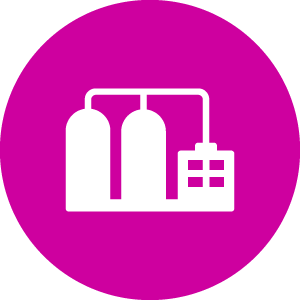Zero-Carbon Fuels
Hydrogen can help reduce global emissions
Unabated fossil fuels currently supply more than 80% of the world’s energy and account for the bulk of the world’s carbon emissions. Despite successful efforts to expand low- and zero-carbon electricity, studies predict that fuels will still serve a quarter of the world’s energy needs by 2050.
At CATF, we work to accelerate the development and deployment of hydrogen to achieve our climate goals of net-zero greenhouse gas emissions by midcentury.
What are zero-carbon fuels?
Zero-carbon fuels like hydrogen (H₂) and ammonia (NH₃) are fuels that emit no carbon dioxide when they’re burned. While electrification combined with the expansion of low- and zero-carbon electricity resources are a key strategy for decarbonizing the global economy, there are some sectors that are difficult or impossible to electrify. These sectors include heavy transportation, heavy industry, and marine shipping.
Cost-effective zero-carbon fuels could replace the conventional fuels used in these sectors, playing an essential role in eliminating greenhouse emissions and moving forward the clean energy transition.

Why do we need hydrogen?
Today, most of the world’s energy supply comes from fossil fuels like petroleum and natural gas. Because these fossil fuels are responsible for 80% of the carbon emissions damaging our atmosphere, substituting them with zero-carbon fuels like hydrogen could help reduce harmful pollution.
Key benefits of hydrogen:

They are produced via clean pathways, emitting no carbon dioxide when burned

Their production can be scaled up, allowing them to become cost-competitive with fossil fuels

They are always available and compatible with existing networks
Zero-carbon fuels FAQs
How are zero-carbon fuels produced?
Today, most hydrogen is produced from fossil fuels at facilities that lack emissions controls for carbon dioxide and methane. But cleaner production technologies are both available and worthy of further investment. Hydrogen can be produced in multiple ways to minimize greenhouse gas emissions from its production. One method is by electrolyzers powered by zero-carbon electricity like renewable energy or nuclear power. Alternately, hydrogen can be made at facilities equipped with carbon capture and sequestration systems and that use abated natural gas sourced from producers with strong systems in place for detecting and eliminating methane venting, flaring, and leakage from gas production, and transport infrastructure to minimize upstream methane emissions.
What is the difference between zero-carbon, net-zero, and carbon-neutral?
Zero-carbon is an adjective that refers to a fuel or energy source that either lacks a carbon molecule in its chemical composition, or emits no carbon dioxide at its point of use. Carbon-neutral refers to processes in which the amount of carbon dioxide emitted does not exceed the amount of carbon dioxide removed. Net-zero is similar to the concept of carbon neutral, and is often used to refer to broader systems whose climate impact can be balanced between greenhouse gas emissions and emissions offsets (like carbon capture or carbon removal).
Is hydrogen energy clean?
Because hydrogen (H₂) and ammonia (NH₃) are energy carriers that can be produced with little to no greenhouse gas emissions, they can be climate-beneficial fuels that help us reach our global emission reduction goals. They do not contain carbon atoms, so they do not emit carbon dioxide when used to make energy in engines, fuel cells, and other equipment. Decisions made throughout the value chain – from production to transportation and storage to end-use by consumers – will dictate their overall climate impact.
What makes hydrogen and ammonia zero-carbon fuels?
On a chemical level, a zero-carbon fuel doesn’t have any carbon atoms. A hydrogen molecule, for example, contains just two bonded hydrogen atoms. Ammonia molecules are made up of a nitrogen atom bonded with three hydrogen atoms. Consequently, when hydrogen or ammonia is burned in an engine to make energy, no carbon dioxide is emitted.
Key sectors for decarbonization
Hydrogen could be particularly advantageous in key sectors that are responsible for a
significant portion of carbon emissions, and that are difficult or impossible to electrify. CATF has prioritized
six specific sectors as critical for deep decarbonization of the economy:

Heavy-duty Trucking

Marine Shipping

Aviation Fuels

Industrial Process Heating

Ironmaking

Power System Balancing
Learn more about how hydrogen can decarbonize global energy.
Get Involved
Make an impact by donating to CATF
As a CATF supporter, you are investing in our efforts to successfully implement new strategies and build strong partnerships that drive progress forward. Donate or sign up to receive the latest content, news, and developments from CATF experts.


